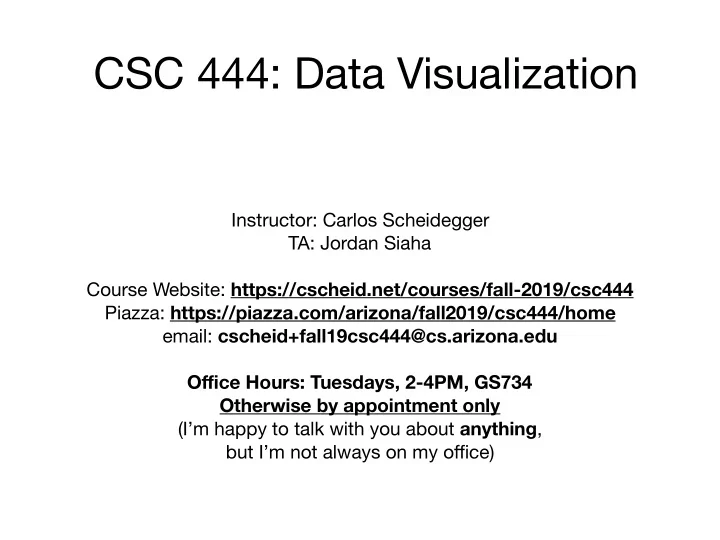

CSC 444: Data Visualization Instructor: Carlos Scheidegger TA: Jordan Siaha Course Website: https://cscheid.net/courses/fall-2019/csc444 Piazza: https://piazza.com/arizona/fall2019/csc444/home email: cscheid+fall19csc444@cs.arizona.edu O ffi ce Hours: Tuesdays, 2-4PM, GS734 Otherwise by appointment only (I’m happy to talk with you about anything , but I’m not always on my o ffi ce)
Before we start • Let’s read the syllabus : https://cscheid.net/ courses/fall-2019/csc444/syllabus.html • Many small programming assignments (50%), one midterm exam (20%), one final exam (30%) • First assignment has been posted! • https://cscheid.net/courses/fall-2019/csc444/ assignment_1.html
Before we start • Mental Health and Wellness • There are many resources available to you at UA • Do not hesitate to contact CAPS or advising@cs. if you are struggling or want to talk someone
Vis is both ubiquitous and subtle • Frank Anscombe, “Graphs in Statistical Analysis”
Activity: let’s try to make sense of this data • Think about what you’d try, 1 minute • Gather in small groups, talk • Share with everyone
What did we try? • https://cscheid.net/courses/fall-2019/csc444/ lectures/lecture1/anscombe/
Something interesting just happened: isn’t this a visualization too?!
The way in which data is presented changes how we consume it, drastically .
You will learn how—and how not—to build interactive data visualizations
Three main themes Mechanics : how do I build a visualization? • • Javascript, CSS, HTML, d3 Principles : why should I build it in this way? • • mathematical and perceptual arguments Techniques : how do I turn principles and mechanics • into an actual visualization? • algorithms, software libraries
Assessment One small assignment per week , 50% weight • ~2-5 hours per assignment • One closed-book midterm , 20% weight • hour-long • One closed-book final, comprehensive exam , 30% weight • Class participation, 5% weight • • piazza counts
Grading Performance grade: • • ≥ 90%: A, ≥ 80%: B, ≥ 70%: C, ≥ 60%: D, <50%: F
Plagiarism and Academic Conduct Policy Unless I state otherwise, you are allowed to use any open source • library you want in your projects, provided that you give it credit . • Assignments will be small If you pass off someone else’s work as yours, that’s plagiarism . • • The penalty for plagiarism always includes a referral to the college, and ranges from an automatic zero in the assignment to an automatic F in the course to expulsion from the university. Don’t do it. • Don’t do it. •
Textbook No required textbook , but you won’t regret buying • Munzner’s “Visualization Analysis and Design” Available in digital form • from UA library as well All required reading • material will be given in lecture notes, webpages, and research papers http://www.amazon.com/Visualization-Analysis-Design-AK-Peters/dp/1466508914
Textbook You will also probably make good use of Scott • Murray’s “Interactive Visualization for the Web” Available through O’Reilly Safari on campus (see • course website for details)
Important Vis Books William Cleveland, The Elements of Graphing Data , • Visualizing Data John W. Tukey, Exploratory Data Analysis • Jacques Bertin, Semiology of Graphics • Edward Tufte, The Visual Display of Quantitative Information , • Visual Explanations , Envisioning Information Colin Ware, Information Visualization • Come take a look at them during office hours if you’re curious; • they’re not cheap :(
Mechanics Writing programs: we will use the web technology • stack • Javascript, SVG, CSS, HTML, d3
http://bit.ly/1swfb5p http://i.imgur.com/wR3ZxfB.jpg
Stick with it, though! http://bl.ocks.org/mbostock
It’s easy to talk to a server Good reasons to choose the web stack: It’s ubiquitous nanocubes.net It’s fast! apple.com arstechnica.com
Principles Building a visualization is fundamentally about tradeoffs. Principles help us understand these tradeoffs, and make informed decisions
Pre-attentive Processing Examples from Christopher Healey’s excellent resource http://www.csc.ncsu.edu/faculty/healey/PP/ Demo: https://cscheid.net/courses/fal18/csc444/lectures/ lecture1/boundary/
Change Blindness (photosensitive epilepsy? please look away.)
http://www.csc.ncsu.edu/faculty/healey/PP/
Respect the math in the data Not everything you can do with data makes sense
http://imgur.com/gNefvUG/
http://viz.wtf/post/107998162170/6-7-gender-neutral#notes
http://viz.wtf/post/107440754050/ how-payday-loans-add-up#notes
Techniques How do we turn the mechanics and principles into an actual, working visualization?
Linked views demo: http://square.github.io/crossfilter/
Treemaps demo: GrandPerspective
A tour of visualization and visual thinking http://cscheid.net/courses/fall-2019/csc444/lectures/ lecture1.html
CSC 444 Summary 4 weeks of mechanics, 5 weeks of principles, 6 • weeks of techniques ~1 small assignment a week, 1 midterm, 1 final • exam Course website: https://cscheid.net/courses/fall-2019/csc444 Today’s lecture: https://cscheid.net/courses/fall-2019/csc444/lectures/ week1.html
Recommend
More recommend